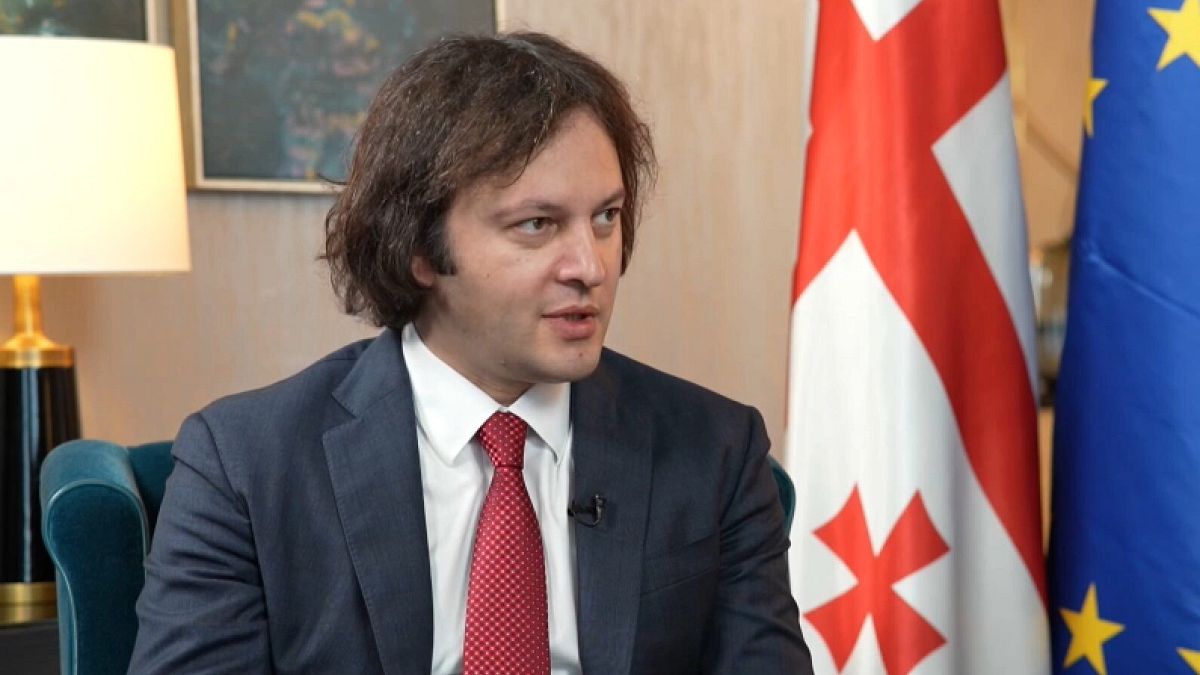EU needs to be more flexible in membership talks, Georgia’s PM says

Georgian Prime Minister Irakli Kobakhidze told Euronews that the country is still confident of obtaining European Union membership by 2030.
In his first interview after the South Caucasus country hit pause on its EU accession talks, Georgian Prime Minister Irakli Kobakhidze told Euronews that the ball was in Brussels’ court, and that the bloc needed to be more flexible in its approach to new members.
Kobakhidze said Georgia was facing “some significant challenges with the European bureaucracy” but emphasised that he was still “very optimistic” that his country would obtain EU membership by 2030.
“(We) will be consistent in following this goal and then hopeful that the approach to Georgia will be more fair in the next coming years,” he told Euronews.
In November, Kobakhidze announced that Georgia would pause discussions on its bid to join the EU until 2028 due to what the prime minister described then as “blackmail and manipulation” from some of the bloc’s politicians.
The EU gave Georgia candidate status in December 2023, but halted its membership application process indefinitely and cut financial support last June after the passage of a “foreign influence” law that the bloc considers to be Russian-inspired and authoritarian.
Kobakhidze told Euronews that Tbilisi’s policies were not to blame for the fact that there are currently not “healthy relations” between Georgia and the EU.
“It’s because of the European bureaucracy and the policies towards Georgia,” he said. “So, if that policy changes, everything will be in a better shape.”
Kobakhidze was reappointed in November as prime minister by the ruling Georgian Dream party, whose disputed victory in October’s parliamentary election has sparked massive demonstrations and led to an opposition boycott of parliament.
Opposition forces — including Georgia’s former pro-Western president Salome Zourabichvili — have condemned the results as a “total falsification” of the vote. The European Parliament in November adopted a resolution condemning the vote and calling for new elections to be held under international supervision.
The ruling party, which has been in power since 2012, has denied any wrongdoing.
Realism with Russia relations
Meanwhile, protesters and critics have accused Georgian Dream — established by Bidzina Ivanishvili, a billionaire who made his fortune in Russia and is widely considered to be the country’s de facto leader — of turning away from the West and towards Moscow.
Kobakhidze told Euronews that Georgia had “no space for restoring diplomatic relations (with Russia) because of the occupation of our two historic regions”.
Moscow recognised the breakaway regions of South Ossetia and Abkhazia as independent states in 2008 after Russian troops repelled a Georgian attempt to retake South Ossetia in a brief war. The two breakaway territories make up 20% of Georgia’s territory.
“This territorial integrity is recognised by the international community and of course we have to defend our national interests in this respect, but our vision is peaceful,” Kobakhidze said, adding that a “non-peaceful solution is absolutely impossible”.
“We would like to restore our territorial integrity — there’s no alternative — and we are hopeful at some point this will be realistic. Let’s see,” he said.
“But we run with a pragmatic policy and that’s the key content of our policy towards Russia,” Kobakhidze added. “We are keeping trade and economic relations with Russia and that’s how we are going to run it for now.”
When asked about Russia’s full-scale invasion of Ukraine in 2022 and the prospect of a peace agreement, Kobakhidze said there was “no alternative” to a ceasefire.
Ukraine is “suffering a lot”, the prime minister said, citing the loss of life, damage to infrastructure and Russia’s occupation of large swathes of Ukrainian territory.
“The international community should be fully concentrated on promoting this ceasefire agreement and peace,” Kobakhidze said. “That’s the key for improving the overall situation in the region and the world.”
Watch the entire interview on Euronews’ The Europe Conversation this week.
World News || Latest News || U.S. News
Source link



